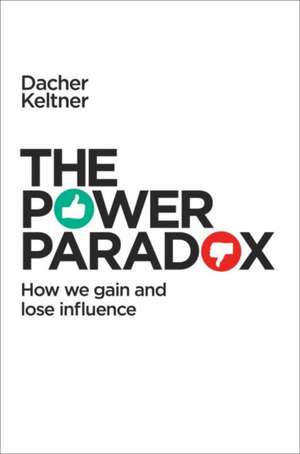The Power Paradox: How We Gain and Lose Influence
Autor Dacher Keltneren Limba Engleză Hardback – 16 mai 2016
It is taken for granted that power corrupts. This is reinforced culturally by everything from Machiavelli to contemporary politics. But how do we get power? And how does it change our behavior? So often, in spite of our best intentions, we lose our hard-won power. Enduring power comes from empathy and giving. Above all, power is given to us by other people. This is what all-too-often we forget, and what Dr. Keltner sets straight. This is the crux of the power paradox: by fundamentally misunderstanding the behaviors that helped us to gain power in the first place we set ourselves up to fall from power. We can't retain power because we've never understood it correctly, until now. Power isn't the capacity to act in cruel and uncaring ways; it is the ability to do good for others, expressed in daily life, and itself a good a thing.
Dr. Keltner lays out exactly--in twenty original "Power Principles"-- how to retain power, why power can be a demonstrably good thing, and the terrible consequences of letting those around us languish in powerlessness.
| Toate formatele și edițiile | Preț | Express |
|---|---|---|
| Paperback (2) | 57.12 lei 22-33 zile | +18.71 lei 6-12 zile |
| Penguin Books – 3 mai 2017 | 57.12 lei 22-33 zile | +18.71 lei 6-12 zile |
| Penguin Books – 15 mai 2017 | 88.86 lei 3-5 săpt. |
Preț: 160.40 lei
Nou
30.69€ • 31.71$ • 25.53£
Cartea nu se mai tipărește
Specificații
ISBN-10: 1594205248
Pagini: 208
Dimensiuni: 160 x 234 x 20 mm
Greutate: 0.36 kg
Editura: Penguin Press
Notă biografică
Dacher Keltner is Professor of Psychology and the Director of the Greater Good Science Center at the University of California, Berkeley. A renowned expert in the biological and evolutionary origins of human emotion, he has received numerous prizes for his research, which has been covered in The New York Times, Newsweek, the BBC and CNN. He is the bestselling author of Born to Be Good and has served as a consultant to Google, Facebook, and on the award-winning Pixar film, Inside Out. In 2008, the Utne Reader listed him as one of the fifty visionaries changing the world.
Recenzii
Lively and intriguing... The Power Paradox deliversa much-needed dose of positivityin the study of how managers and leaders can get the best out of their workers and populations
The Westminster old guard sat all around him may not realise it, but Dacher Keltner and his ideas may pose a severe challenge to their way of doing business. And it gets worse: as he and his cohorts render them obsolete, they will rub it in by beingniceto them
Dacher Keltner is the most interesting psychologist in America. He's busy changing the minds of Americans about how power works, how inequality works.It's only a matter of time before his ideas spread everywhere.And unlike most psychologists I know, he's not a weirdo
The Power Paradoxbrings clarity to our confusion, brimming with evidence-based insights into powerlessness, the selfish uses of power, and the best kind: power that furthers the greater good. Dacher Keltner's brilliant research gives us a lens that lets us see afresh hidden patterns in society, politics, and our own lives.No doubt this will be one of the most significant science books of the decade
Keltner shares insights into many aspects of power, including afternoon tea in Britain and how Lincoln won the presidency ... Provocative and intriguing
That power is not taken but given is true for most human relations today. It has ancient roots in primate behavior. Dacher Keltner applies a lifetime of research to this topic, offering a lively description of how true power is like a return on a social investment in others
With personal insight and the latest science, Keltner is both realistic and idealistic:The Power Paradoxsheds light on human power's dark side, as well as its redeeming qualities. Everyone can learn from this wise book
Textul de pe ultima copertă
How do we gain and maintain power - through coercion or cooperation? What does it do to our behaviour? And what makes us lose power? In twenty revolutionary 'power principles', renowned psychologist Dacher Keltner turns everything we thought we knew about influence and status upside down, redefining power for our times.
'Keltner is the most interesting psychologist in America. It's only a matter of time before his ideas spread everywhere' Michael Lewis
'Sheds light on human power's dark side, as well as its redeeming qualities. Everyone can learn from this wise book' Susan T. Fiske, author of Social Cognition
'A lively description of how true power is like a return on a social investment in others' Frans de Waal, author of Are We Smart Enough to Know How Smart Animals Are?
'Lively and intriguing ... A much-needed dose of positivity' Prospect
Descriere
A revolutionary rethinking of everything we know about power
It shapes every interaction we have, whether we're trying to get a two-year-old to eat green vegetables or ask for a promotion at work. But how do we really gain and maintain power - through coercion or cooperation? What does it do to our behaviour? And what makes us lose power? In twenty revolutionary 'power principles', renowned psychologist Dacher Keltner turns everything we thought we knew about influence and status upside down, redefining power for our times.
'Keltner is the most interesting psychologist in America. It's only a matter of time before his ideas spread everywhere' Michael Lewis
'Sheds light on human power's dark side, as well as its redeeming qualities. Everyone can learn from this wise book' Susan T. Fiske, author of Social Cognition
'A lively description of how true power is like a return on a social investment in others' Frans de Waal, author of Are We Smart Enough to Know How Smart Animals Are?
'Lively and intriguing ... A much-needed dose of positivity' Prospect





















